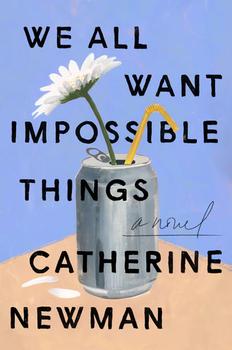Summary | Excerpt | Reading Guide | Reviews | Beyond the book | Read-Alikes | Genres & Themes | Author Bio

A Novel
by Helen GarnerWith its limited settings, The Spare Room reads more like a play than a novel.
The story
unfolds in the offices of an alternative health clinic and in the home of a
woman determined to serve her terminally ill friend. Tensions arise because
Nicola pretends to believe in unconventional treatments (including large doses
of Vitamin C, coffee enemas and ozone saunas) while Helen struggles over whether
or not she should warn her guest that the Theodore Institute preys on the hopes
of desperate patients. The demands of caretaking culminate in an intervention
that forces the patient to stop "smiling" in spite of her pain, and the hostess
to stop feeling responsible for someone else's choices.
Cancer is a disheartening subject, but the author doesn't allow her namesake
narrator to indulge in pity or in lengthy flashbacks of Nicola's healthier days.
When Helen does remember the past, Nicola is presented as a strong, independent,
but not especially heroic woman - an appropriate, measured characterization
considering that The Spare Room isn't about bravely "coming to terms"
with a frightening diagnosis, nor is it about triumph over hardship. There's no
need to set Nicola up for a tragic fall. The story begins long after the
characters have already learned death will be the outcome, freeing the author to
explore facets of illness beyond the course of the illness itself.
The Spare Room has been praised for exploring the relationship between
the women with an honest depth. In an interview for The Sydney Morning Herald,
the author has also stated that she wanted to show "…there can often be a very
dark, semi-conscious struggle" when it comes to caring for the dying.
We soon learn that Nicola is not as naive as she seems. Her actions are more
about distracting herself from the truth that her cancer is incurable than they
are about seeking eleventh-hour solutions. Helen's attempt to become the perfect
attendant is not entirely altruistic. Her dedication could be interpreted as the
need to control the minor details that can be controlled when everything
else seems beyond reckoning, or even less innocently, as the need to be regarded
by others as competent, to be thanked, to be the one remembered as having stood
by Nicola - desires tinged with selflessness and selfishness. The situation is
further complicated by each woman's efforts to maintain the appearance of
normalcy instead of giving in to full-blown anger.
Portraying these nuanced emotions in themselves isn't an unusual achievement;
one would expect an accomplished novelist to create dynamic characters worthy of
the reader's time. What makes The Spare Room particularly notable is the
way in which these emotions unfold - the compressed timeline lends a subtle
urgency to the women's daily routines, and the unadorned writing style leaves
room to imagine all that has been left unsaid. There's a profound sense that the
"negative space" surrounding the subject of the portrait has been considered at
length. The result is an elegantly concise exploration of human frailties.
When death finally arrives, the moment is narrated through Helen's reflections,
using a series of repetitions, e.g.: "I didn't know then…", "I didn't know yet…"
"I could not imagine", "Nor could I foresee", "I couldn't foresee", "I had no
idea that…" This final chapter was unsatisfactory. Compared to the careful pacing in the scenes throughout the rest of the novel, what should have been a moment of well-earned grief turned into a quickly resolved summary.
Regardless of the ending, the dynamics of giving and taking would interest
anyone who has ever experienced a similar situation. As the caregiver, one may
question where to draw the line between allowing the patient as much dignity as
possible and stepping in when he or she no longer seems to be rational. As the
patient, one may worry about burdening others. Readers that have never played
either role aren't likely to be drawn to the more visceral realities of tending
to the dying, but the enduring theme of friendship has every potential to
override any initial hesitations about this novel.
Back-Story
In an interview with the
Sydney Morning Herald, Helen Garner explains that Nicola is based on her
friend Jenya Osborne, who died in March 2006, "an artistic, funny, generous
woman who came from an old country family, wrote and edited, embraced Buddhism
and natural therapies, and lived in bohemian style at a beautiful house on
Sydney's Pittwater." The two were friends for about 15 years. But Garner
says the impetus to write The Spare Room was deeper than just telling
Osborne's story.
Garner sent a manuscript to Osborne's family, firmly committing to change
anything they didn't like, or even to dump the book entirely - but they loved
it. Osborne's sister, Ingrid Davis, wrote to her saying, "It seems
to be an honour that you chose to write about Jenya ... you have put it down so
squarely and beautifully, that would be what Jenya wanted. ... Too many people
dodge around the issue of dying. ... What you have said needs to be said, it
makes our lives right to know what really happens."
First Impressions
19 BookBrowse members have reviewed
The Spare Room rating it an average 4.0 out of 5.0.
![]() This review was originally published in The BookBrowse Review in February 2009, and has been updated for the
March 2010 edition.
Click here to go to this issue.
This review was originally published in The BookBrowse Review in February 2009, and has been updated for the
March 2010 edition.
Click here to go to this issue.

If you liked The Spare Room, try these:

by Catherine Newman
Published 2023
For lovers of Meg Wolitzer, Maria Semple, and Jenny Offill comes this raucous, poignant celebration of life, love, and friendship at its imperfect and radiant best.

by Lloyd Jones
Published 2016
Paint Your Wife is a colorful, sensual novel, brimming with rich stories and even richer characters.
Your guide toexceptional books
BookBrowse seeks out and recommends the best in contemporary fiction and nonfiction—books that not only engage and entertain but also deepen our understanding of ourselves and the world around us.